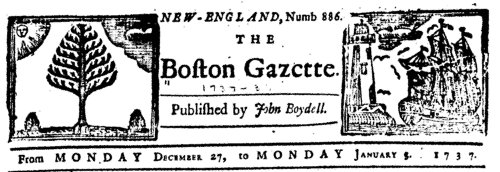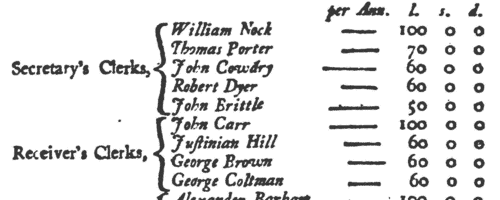Add this eBook to your basket to receive access to all 350 records. Our indexes include entries for the spelling tripp. In the period you have requested, we have the following 350 records (displaying 21 to 30): These sample scans are from the original record. You will get scans of the full pages or articles where the surname you searched for has been found. Your web browser may prevent the sample windows from opening; in this case please change your browser settings to allow pop-up windows from this site.  Masters and Apprentices
(1724) Masters and Apprentices
(1724)
Apprenticeship indentures and clerks' articles were subject to a 6d or 12d per pound stamp duty: the registers of the payments usually give the master's trade, address, and occupation, and the apprentice's father's name and address, as well as details of the date and length of the apprenticeship. 4 May to 31 December 1724. | Sample scan, click to enlarge

|  Masters and Apprentices
(1725) Masters and Apprentices
(1725)
Apprenticeship indentures and clerks' articles were subject to a 6d or 12d per pound stamp duty: the registers of the payments usually give the master's trade, address, and occupation, and the apprentice's father's name and address, as well as details of the date and length of the apprenticeship. 2 January to 14 August 1725. | Sample scan, click to enlarge

|  Masters of Apprentices registered in Somerset
(1723-1726) Masters of Apprentices registered in Somerset
(1723-1726)
Apprenticeship indentures and clerks' articles were subject to a 6d or 12d per pound stamp duty: the registers of the payments usually give the master's trade, address, and occupation, and the apprentice's father's name and address, as well as details of the date and length of the apprenticeship. There are central registers for collections of the stamp duty in London, as well as returns from collectors in the provinces. These collectors generally received duty just from their own county, but sometimes from further afield. Because of the delay before some collectors made their returns, this register includes indentures and articles from as early as 1722. (The sample entry shown on this scan is taken from a Norfolk return) | Sample scan, click to enlarge

|  Masters and Apprentices
(1726) Masters and Apprentices
(1726)
Apprenticeship indentures and clerks' articles were subject to a 6d or 12d per pound stamp duty: the registers of the payments usually give the master's trade, address, and occupation, and the apprentice's father's name and address, as well as details of the date and length of the apprenticeship. 3 January to 31 December 1726 | Sample scan, click to enlarge

|  Masters and Apprentices
(1732) Masters and Apprentices
(1732)
Apprenticeship indentures and clerks' articles were subject to a 6d or 12d per pound stamp duty: the registers of the payments usually give the master's trade, address, and occupation, and the apprentice's father's name and address, as well as details of the date and length of the apprenticeship. 3 January to 30 December 1732 | Sample scan, click to enlarge

|  Masters and Apprentices
(1735) Masters and Apprentices
(1735)
Apprenticeship indentures and clerks' articles were subject to a 6d or 12d per pound stamp duty: the registers of the payments usually give the master's trade, address, and occupation, and the apprentice's father's name and address, as well as details of the date and length of the apprenticeship. 5 April to 31 December 1735 | Sample scan, click to enlarge

| Masters of Ships in Newport, Rhode Island (1737)
The comings and goings of shipping between New England and Britain and the other colonies in America and the West Indies, chronicled in The Boston Gazette.
| Sample scan, click to enlarge

|  Masters and Apprentices
(1738) Masters and Apprentices
(1738)
Apprenticeship indentures and clerks' articles were subject to a 6d or 12d per pound stamp duty: the registers of the payments usually give the master's trade, address, and occupation, and the apprentice's father's name and address, as well as details of the date and length of the apprenticeship. 1 January to 7 October 1738 | Sample scan, click to enlarge

| The Royal Household
(1741)
'A General List, or Catalogue, Of all the Offices and Officers Employ'd In the several Branches of his Majesty's Government Ecclesiastical, Civil, Military, &c. In South-Britain, or England' gives the names (and often the annual salaries) of the government functionaries, civil servants, churchmen and military, systematically arranged section by section. Section 79 lists the King's Officers and Servants in Ordinary Above Stairs, under the Lord Chamberlain, including the Grooms of the Bedchamber, the Gentlemen of the Privy Chamber, Cup Bearers, Carvers, Gentlemen-Sewers, Gentlemen-Ushers of the Privy Chamber, Daily Waiters, Grooms of the Privy Chamber, Quarterly Waiters in Ordinary, Sewers of the Chamber, Pages of the Presence Chamber, Grooms of the Great Chamber, Coffer Bearers, Pages of the Bedchamber and Back Stairs, Officers in the Removing Wardrobe, Standing Wardrobe keepers, the Master of the Robes and his officials, the Waiters of the Robes, Laundress of the Body Linen, Sempstress, Starcher, Necessary Women, Treasurer and Comptroller of the Chamber, Master of the Jewel Office, Master of the Ceremonies, Serjeants-at-Arms, and a host of messengers, musicians, physicians, apothecaries and surgeons; together with the housekeepers for the various palaces, and other royal servants and officials throughout the realm. | Sample scan, click to enlarge

|  Masters and Apprentices
(1744) Masters and Apprentices
(1744)
Apprenticeship indentures and clerks' articles were subject to a 6d or 12d per pound stamp duty: the registers of the payments usually give the master's trade, address, and occupation, and the apprentice's father's name and address, as well as details of the date and length of the apprenticeship. | Sample scan, click to enlarge

|
Research your ancestry, family history, genealogy and one-name study by direct access to original records and archives indexed by surname.
|












